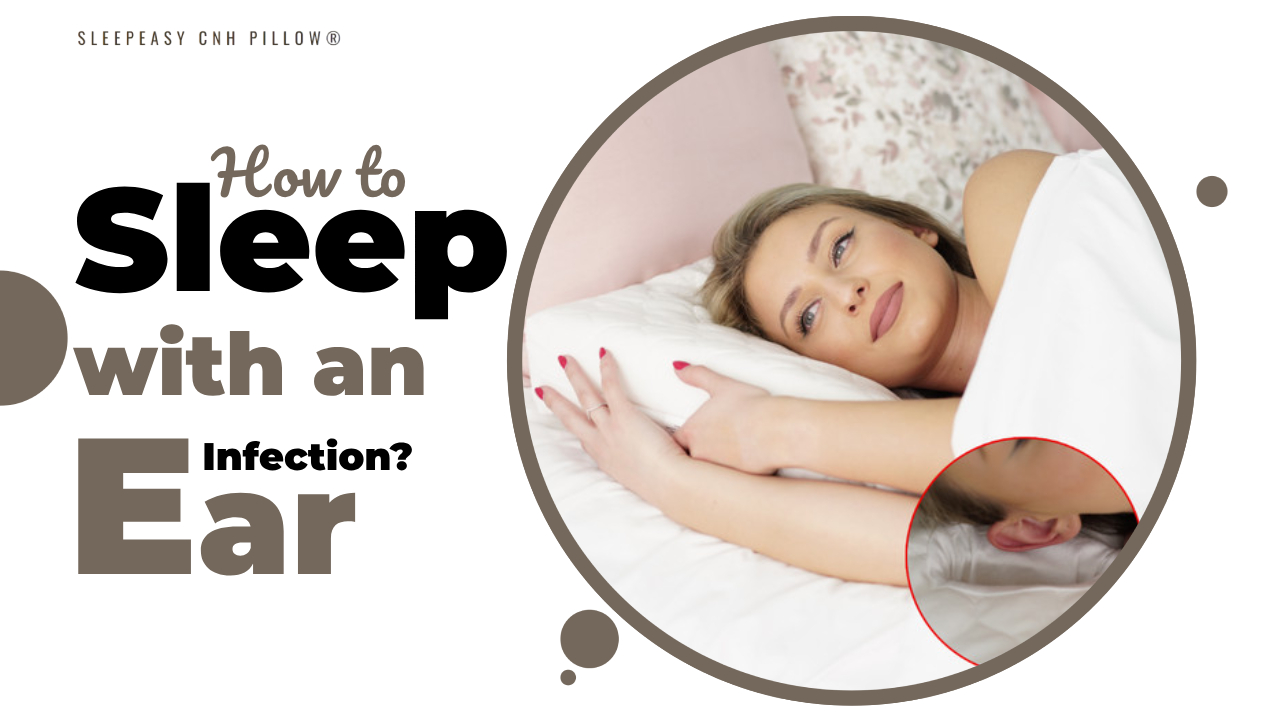How to Sleep with an Ear Infection?
Jan 24th 2024
Keynotes
- Dealing with an ear infection and ensuring a restful night's sleep can be challenging. Ear infections disrupt sleep due to pain, discomfort, and potential hearing difficulties, making it essential to adopt specific strategies.
- Elevating your head, choosing a sleeping position that minimizes pressure on the affected ear, and incorporating pain management techniques are crucial. A warm compress before bedtime and a calming bedtime routine contribute to a more comfortable sleep environment.
- Consider innovative solutions like using an ear pillow with a hole, designed to provide support and reduce pressure on the affected ear for enhanced sleep comfort. If the infection persists, seeking professional medical advice is crucial for a thorough evaluation and tailored recommendations.
Dealing with an ear infection can be challenging, especially when it comes to achieving a restful night's sleep. In this comprehensive guide, we'll explore various strategies and practical tips on how to sleep with an ear infection. From understanding the impact of ear infections on sleep to incorporating lifestyle changes and seeking medical advice, we've got you covered.
Causes of Ear Infections
- Bacterial and Viral Infections: Bacteria like Streptococcus pneumonia and viruses causing colds or flu can lead to ear infections.
- Fluid Buildup: Accumulation of fluid in the middle ear, especially after a respiratory infection, can create an environment for infection.
- Allergies: Allergic reactions to substances like pollen or dust may contribute to ear inflammation.
- Sinus Infections: Infections in the sinuses can extend to the ears, causing inflammation and infection.
- Eustachian Tube Dysfunction: Issues with the Eustachian tubes can lead to fluid buildup, increasing the risk of infection.
- Age and Anatomy: Young children are more susceptible due to shorter, more horizontal Eustachian tubes. Certain anatomical factors can also contribute.
Understanding the Impact of Ear Infections on Sleep
Ear infections can disrupt the usual sleep routine due to pain, discomfort, and potential hearing difficulties. The inflammation and pressure within the ear can make finding a comfortable sleeping position a daunting task. The ear pain while sleeping might be exacerbated when lying down, making it crucial to adopt specific measures to minimize discomfort during the night.
Tips for Sleeping Comfortably with an Ear Infection:
- Elevation Techniques: Consider sleeping with your head elevated to help drain fluids from the ear. This can be achieved by using an extra pillow or an adjustable bed.
- Choose the Right Sleeping Position: Opt for a sleeping position that minimizes pressure on the affected ear. Sleeping on the opposite side or your back can often provide relief.
- Pain Management: Take over-the-counter pain relievers or prescribed medications as directed by your healthcare provider before bedtime to manage ear pain and inflammation.
- Warm Compress: Apply a warm compress to the affected ear before bedtime. This can help soothe pain and reduce inflammation, promoting a more comfortable sleep.
- Create a Relaxing Bedtime Routine: Establish a calming bedtime routine to help you unwind before sleep. This may include activities such as gentle stretching, reading a book, or practicing relaxation techniques.
- Keep the Bedroom Comfortable: Maintain a comfortable sleep environment by regulating the room temperature, using soft bedding, and ensuring minimal noise disturbances.
Innovative Solutions: Incorporating an Ear Pillow with a Hole
For additional relief, consider using an innovative solution—an ear pillow with a hole. This specially designed pillow accommodates ear infections, providing support while reducing pressure on the affected ear. The unique design allows for a more comfortable sleep experience, enhancing the overall effectiveness of your sleep hygiene routine.

Lifestyle Changes to Support Healing:
- Hydration: Stay well-hydrated to support the body's natural healing processes. Proper hydration can also prevent dehydration, a common side effect of some medications.
- Avoiding Irritants: Steer clear of irritants such as smoke, strong odors, or allergens that could exacerbate the ear infection and disrupt sleep.
- Gentle Ear Care: Practice gentle ear hygiene to avoid further irritation. Avoid inserting objects into the ear canal, and if necessary, use a warm saline solution to clean the outer ear.
Conclusion
Sleeping with an ear infection requires a combination of lifestyle adjustments, pain management strategies, and, when necessary, professional medical guidance. By incorporating these tips into your routine, along with considering innovative solutions like an ear pillow with a hole, you can create a conducive environment for restful sleep while supporting the healing process of your ear infection. Remember, consulting with a healthcare professional is essential for personalized advice and effective treatment.
